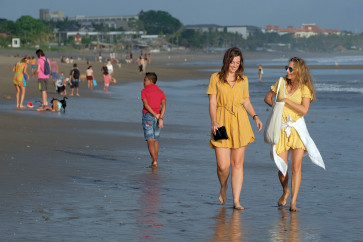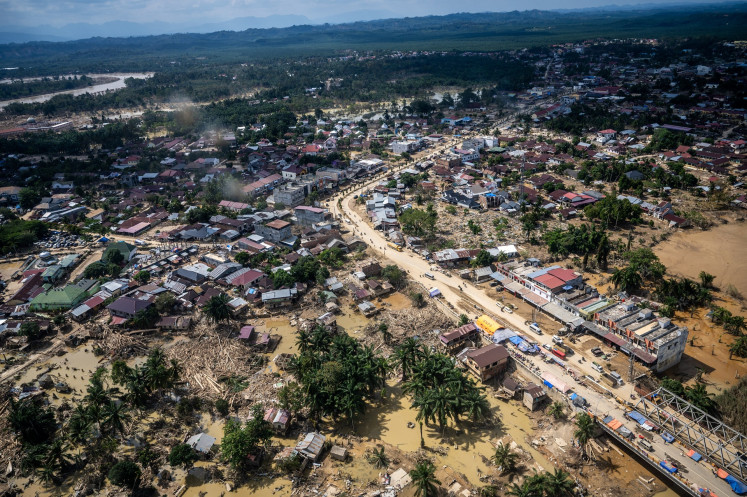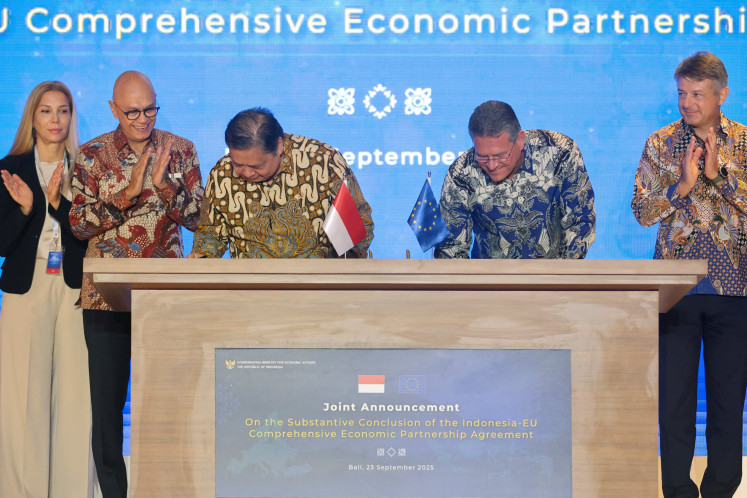Popular Reads
Top Results
Can't find what you're looking for?
View all search resultsPopular Reads
Top Results
Can't find what you're looking for?
View all search resultsBW Plantation sees plunging profits
Publicly listed plantation company PT BW Plantation saw its profits plunge significantly last year despite increasing sales, as it suffered from rising costs and price volatility
Change text size
Gift Premium Articles
to Anyone
P
ublicly listed plantation company PT BW Plantation saw its profits plunge significantly last year despite increasing sales, as it suffered from rising costs and price volatility.
The firm booked stronger sales last year, growing by 20.74 percent to Rp 1.14 trillion (US$100.17 million), thanks to an increase in the sales volume of its crude palm oil (CPO) and palm kernels.
In comparison, the company posted Rp 944.27 billion in 2012.
The significant jump in profit was, however, unable to prevent its bottom line from slumping, as the company saw net profits down by 44 percent to Rp 181.78 billion last year, compared to the Rp 262.18 billion it earned in the previous year ' according to the company's full year financial result posted on the Indonesia Stock Exchange (IDX) web portal on Monday.
An appendix published along with the financial results showed that the company's CPO sales increased by nearly 22 percent to 145,836 tons last year from the 119,624 tons it marketed in the previous year.
Its kernel sales rose 20.7 percent to 23,840 tons in 2013 compared to 19,752 in 2012.
Its CPO output grew by nearly 13 percent to 141,195 tons from 125,196 tons in the previous year.
Its kernel production, on the other hand, went up by about 9 percent to 23,610 tons year-on-year.
The company had previously set its 2013 revenue target at around Rp 1 trillion, about 6 percent higher than last year, while aiming at booking Rp 200 billion in net profits, around the same level as the previous year.
While it managed to book the targeted revenue, the company failed to secure the projected profit, with its average selling prices slipping significantly last year, improving only toward year-end.
The company's CPO price went down by 2.7 percent to Rp 6,989 in 2014, compared to the Rp 7,179 it maintained in 2012.
It suffered a steep decline in CPO prices in the first half of last year, standing at Rp 6,351 per kilogram as of June, or down more than 16 percent compared to the same period in the previous year.
Its palm kernel price recorded a worse decline, falling 30 percent year-on-year to Rp 2,564 per kilogram in the first six months, before the company gradually mitigated the average price to stand at Rp 3,227 last year, up by 0.8 percent year-on-year.
The company's cost of goods sold increased to Rp 603.04 billion in 2013, compared to Rp 373.11 billion the previous year, further suppressing the company's bottom line.
Its operating expenses went up by 40 percent year-on-year to Rp 215.6 billion.
Not only suffering from plunging prices and rising costs, the company was also affected by the rupiah's depreciation against the US dollar, as it saw its loss on foreign exchange double to Rp 1.6 billion last year compared to Rp 835.64 billion in the previous year.
Its total plantation area will amount to 89,469 hectares in June this year, scattered across Central Kalimantan, East Kalimantan and West Kalimantan. Its total planted area reached 62,061 hectares.
At the moment, BW has more than 89,000 hectares of plantations in Central Kalimantan, East Kalimantan and West Kalimantan, and its total planted areas have exceeded 62,000 hectares.
It runs four mills, with a total production capacity of 195 tons per hour, in Central Kalimantan.
As for this year, BW Plantation financial director Kelik Irwantono said the company had a positive outlook, citing the latest improvement in its selling price.
The positive outlook will also be supported by the company's higher batch of mature plantations, according to Kelik.
It predicts it will see at least 10,600 hectares of plantation become mature next year.









